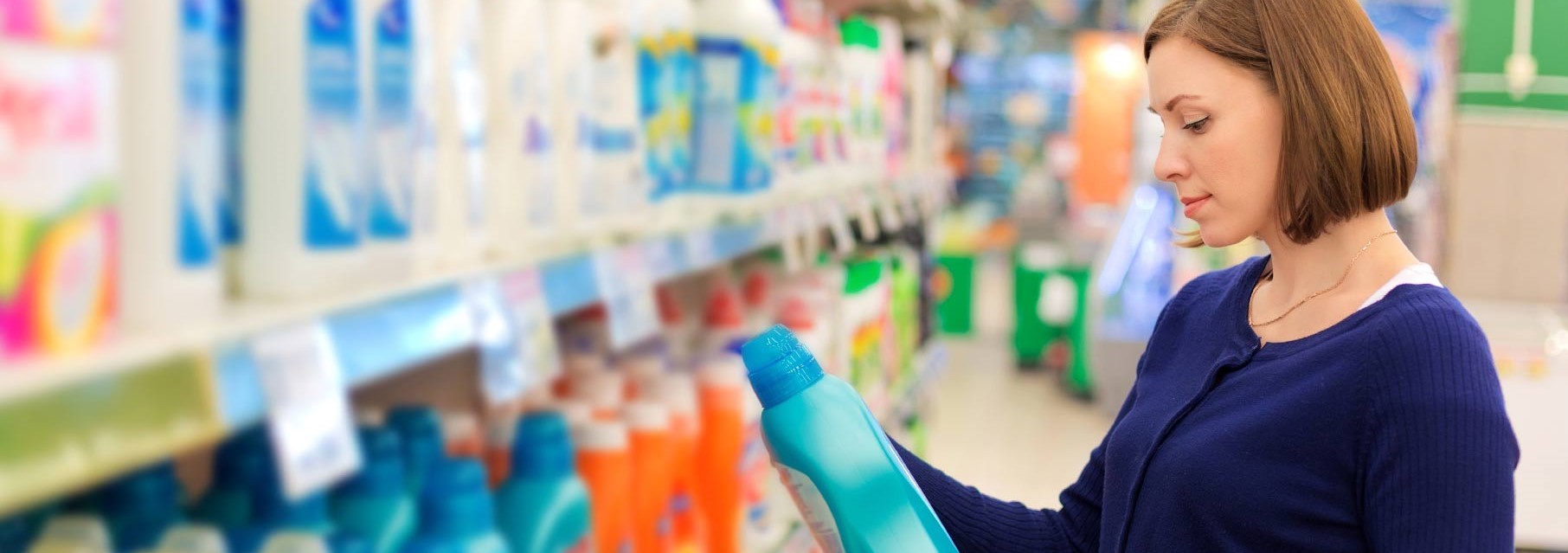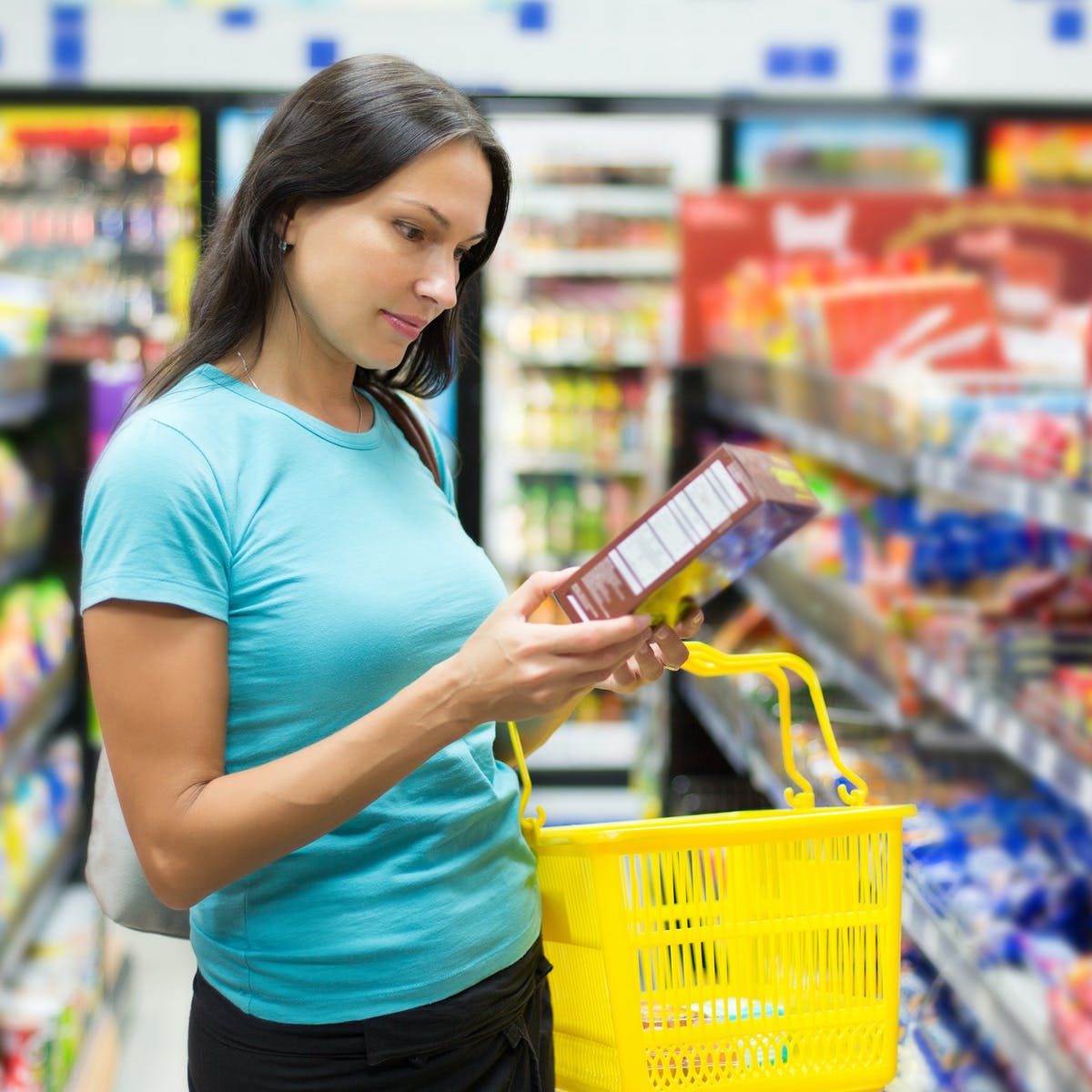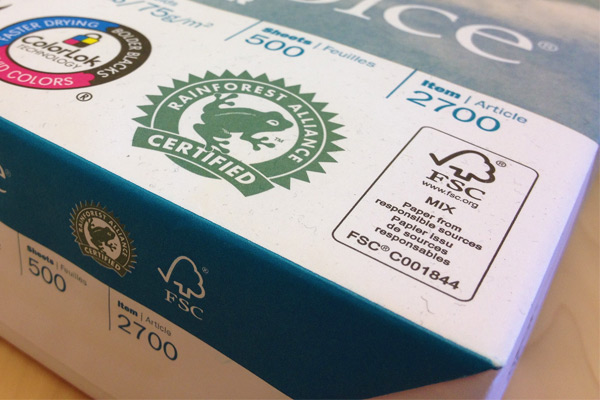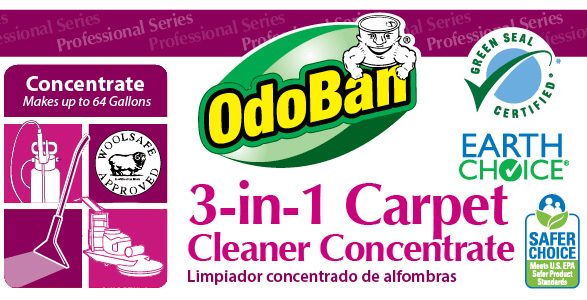
Dear Eartha, I want to be an educated shopper, but I don’t have time to read every label in the grocery store. How do I shop with the environment in mind without wasting time?
 It’s easy to get overwhelmed in the grocery store. With all the green jargon like, “natural” and “locally-sourced”, how do any of us know what’s best? Fortunately, there are a handful of eco-certifications to help your decision-making process. With this knowledge in mind, you can save the anxiety for which ice cream flavor to choose, not which laundry detergent to buy.
Certification programs, specifically those that are third-party verified, are intended to increase transparency along the supply chain to help inform consumers and promote sustainable consumption. If a product passes muster, it gets to slap an identifying label on its packaging. Buyer beware, not all third-party certifications are created equally – the label is only as good as the certifier themselves.
To help you take the guesswork out of your grocery shopping, here are some of the labels I look for when I stock up. If you struggle to find items with these designations, consider asking your local store to start selling certified sustainable products.
Paper Products
If you knew your super soft toilet paper contributed to deforestation of Canada’s boreal forests, would you still buy it? This large forest – covering roughly 60% of Canada – absorbs carbon dioxide from the atmosphere equivalent to the annual emissions of 24 million cars! Unfortunately, many large brands have refused to switch to more sustainable materials, causing destruction to this vital forest. According to the Natural Resources Defense Council, about 28 million acres of Canadian boreal forest have been slashed since 1996. So, what can you do? Keep your eye out for these certifications which set minimum environmental standards for paper products:
It’s easy to get overwhelmed in the grocery store. With all the green jargon like, “natural” and “locally-sourced”, how do any of us know what’s best? Fortunately, there are a handful of eco-certifications to help your decision-making process. With this knowledge in mind, you can save the anxiety for which ice cream flavor to choose, not which laundry detergent to buy.
Certification programs, specifically those that are third-party verified, are intended to increase transparency along the supply chain to help inform consumers and promote sustainable consumption. If a product passes muster, it gets to slap an identifying label on its packaging. Buyer beware, not all third-party certifications are created equally – the label is only as good as the certifier themselves.
To help you take the guesswork out of your grocery shopping, here are some of the labels I look for when I stock up. If you struggle to find items with these designations, consider asking your local store to start selling certified sustainable products.
Paper Products
If you knew your super soft toilet paper contributed to deforestation of Canada’s boreal forests, would you still buy it? This large forest – covering roughly 60% of Canada – absorbs carbon dioxide from the atmosphere equivalent to the annual emissions of 24 million cars! Unfortunately, many large brands have refused to switch to more sustainable materials, causing destruction to this vital forest. According to the Natural Resources Defense Council, about 28 million acres of Canadian boreal forest have been slashed since 1996. So, what can you do? Keep your eye out for these certifications which set minimum environmental standards for paper products:
 Forest Stewardship Council (FSC) certification is designated for responsibly produced wood and paper products, some of which is used to package food and other consumer goods. FSC promotes practices that protect water quality, endangered wildlife, the rights of indigenous people, and more.
Rainforest Alliance works to conserve forests and natural resources and promote the rights and well-being of workers, their families, and communities. The Rainforest Alliance Certified™ seal—the green frog—can be found on thousands of wood and agricultural products.
Cleaning Products
While intended to keep things clean, detergents that contain phosphates have the opposite effect. How? Excess phosphorus in water causes an overgrowth of algae which uses up the oxygen available for aquatic life, making it impossible for anything to survive. Not to mention, toxins released from algae blooms can also contaminate drinking water, causing illness for humans and animals. Fortunately, as educated consumers, we can look for these certifications that are designed to help protect the environment, not harm it:
Forest Stewardship Council (FSC) certification is designated for responsibly produced wood and paper products, some of which is used to package food and other consumer goods. FSC promotes practices that protect water quality, endangered wildlife, the rights of indigenous people, and more.
Rainforest Alliance works to conserve forests and natural resources and promote the rights and well-being of workers, their families, and communities. The Rainforest Alliance Certified™ seal—the green frog—can be found on thousands of wood and agricultural products.
Cleaning Products
While intended to keep things clean, detergents that contain phosphates have the opposite effect. How? Excess phosphorus in water causes an overgrowth of algae which uses up the oxygen available for aquatic life, making it impossible for anything to survive. Not to mention, toxins released from algae blooms can also contaminate drinking water, causing illness for humans and animals. Fortunately, as educated consumers, we can look for these certifications that are designed to help protect the environment, not harm it:
 EPA Safer Choice certified products contain ingredients that are safer for humans, pets, and the environment.
Green Seal certified products are designed to preserve the climate, ensure clean water, protect human health, and minimize waste.
This one gets its own category…
According to World Wildlife Fund, half of all packaged products Americans consume contain palm oil. Yup, you’ll find this sneaky ingredient in soaps, cosmetics, detergents and even…ice cream! So, what’s the problem? Well, as the global demand for palm oil increases, so does the destruction of tropical forests. These are essential habitats for many endangered species, and they’re being burned and cleared to make room for palm plantations, causing increased greenhouse gas emissions, soil and water pollution, and erosion.
Fortunately, the Roundtable for Sustainable Palm Oil (RSPO) certification is an assurance to the customer that the standard of palm oil production is sustainable and produced in ways that help protect rain forests, wildlife, water resources and limit impacts on climate change.
So, next time you catch yourself stumped in the store, just remember to look for the labels that will help you make a quick – and educated – decision.
EPA Safer Choice certified products contain ingredients that are safer for humans, pets, and the environment.
Green Seal certified products are designed to preserve the climate, ensure clean water, protect human health, and minimize waste.
This one gets its own category…
According to World Wildlife Fund, half of all packaged products Americans consume contain palm oil. Yup, you’ll find this sneaky ingredient in soaps, cosmetics, detergents and even…ice cream! So, what’s the problem? Well, as the global demand for palm oil increases, so does the destruction of tropical forests. These are essential habitats for many endangered species, and they’re being burned and cleared to make room for palm plantations, causing increased greenhouse gas emissions, soil and water pollution, and erosion.
Fortunately, the Roundtable for Sustainable Palm Oil (RSPO) certification is an assurance to the customer that the standard of palm oil production is sustainable and produced in ways that help protect rain forests, wildlife, water resources and limit impacts on climate change.
So, next time you catch yourself stumped in the store, just remember to look for the labels that will help you make a quick – and educated – decision.
 It’s easy to get overwhelmed in the grocery store. With all the green jargon like, “natural” and “locally-sourced”, how do any of us know what’s best? Fortunately, there are a handful of eco-certifications to help your decision-making process. With this knowledge in mind, you can save the anxiety for which ice cream flavor to choose, not which laundry detergent to buy.
Certification programs, specifically those that are third-party verified, are intended to increase transparency along the supply chain to help inform consumers and promote sustainable consumption. If a product passes muster, it gets to slap an identifying label on its packaging. Buyer beware, not all third-party certifications are created equally – the label is only as good as the certifier themselves.
To help you take the guesswork out of your grocery shopping, here are some of the labels I look for when I stock up. If you struggle to find items with these designations, consider asking your local store to start selling certified sustainable products.
Paper Products
If you knew your super soft toilet paper contributed to deforestation of Canada’s boreal forests, would you still buy it? This large forest – covering roughly 60% of Canada – absorbs carbon dioxide from the atmosphere equivalent to the annual emissions of 24 million cars! Unfortunately, many large brands have refused to switch to more sustainable materials, causing destruction to this vital forest. According to the Natural Resources Defense Council, about 28 million acres of Canadian boreal forest have been slashed since 1996. So, what can you do? Keep your eye out for these certifications which set minimum environmental standards for paper products:
It’s easy to get overwhelmed in the grocery store. With all the green jargon like, “natural” and “locally-sourced”, how do any of us know what’s best? Fortunately, there are a handful of eco-certifications to help your decision-making process. With this knowledge in mind, you can save the anxiety for which ice cream flavor to choose, not which laundry detergent to buy.
Certification programs, specifically those that are third-party verified, are intended to increase transparency along the supply chain to help inform consumers and promote sustainable consumption. If a product passes muster, it gets to slap an identifying label on its packaging. Buyer beware, not all third-party certifications are created equally – the label is only as good as the certifier themselves.
To help you take the guesswork out of your grocery shopping, here are some of the labels I look for when I stock up. If you struggle to find items with these designations, consider asking your local store to start selling certified sustainable products.
Paper Products
If you knew your super soft toilet paper contributed to deforestation of Canada’s boreal forests, would you still buy it? This large forest – covering roughly 60% of Canada – absorbs carbon dioxide from the atmosphere equivalent to the annual emissions of 24 million cars! Unfortunately, many large brands have refused to switch to more sustainable materials, causing destruction to this vital forest. According to the Natural Resources Defense Council, about 28 million acres of Canadian boreal forest have been slashed since 1996. So, what can you do? Keep your eye out for these certifications which set minimum environmental standards for paper products:
 Forest Stewardship Council (FSC) certification is designated for responsibly produced wood and paper products, some of which is used to package food and other consumer goods. FSC promotes practices that protect water quality, endangered wildlife, the rights of indigenous people, and more.
Rainforest Alliance works to conserve forests and natural resources and promote the rights and well-being of workers, their families, and communities. The Rainforest Alliance Certified™ seal—the green frog—can be found on thousands of wood and agricultural products.
Cleaning Products
While intended to keep things clean, detergents that contain phosphates have the opposite effect. How? Excess phosphorus in water causes an overgrowth of algae which uses up the oxygen available for aquatic life, making it impossible for anything to survive. Not to mention, toxins released from algae blooms can also contaminate drinking water, causing illness for humans and animals. Fortunately, as educated consumers, we can look for these certifications that are designed to help protect the environment, not harm it:
Forest Stewardship Council (FSC) certification is designated for responsibly produced wood and paper products, some of which is used to package food and other consumer goods. FSC promotes practices that protect water quality, endangered wildlife, the rights of indigenous people, and more.
Rainforest Alliance works to conserve forests and natural resources and promote the rights and well-being of workers, their families, and communities. The Rainforest Alliance Certified™ seal—the green frog—can be found on thousands of wood and agricultural products.
Cleaning Products
While intended to keep things clean, detergents that contain phosphates have the opposite effect. How? Excess phosphorus in water causes an overgrowth of algae which uses up the oxygen available for aquatic life, making it impossible for anything to survive. Not to mention, toxins released from algae blooms can also contaminate drinking water, causing illness for humans and animals. Fortunately, as educated consumers, we can look for these certifications that are designed to help protect the environment, not harm it:
 EPA Safer Choice certified products contain ingredients that are safer for humans, pets, and the environment.
Green Seal certified products are designed to preserve the climate, ensure clean water, protect human health, and minimize waste.
This one gets its own category…
According to World Wildlife Fund, half of all packaged products Americans consume contain palm oil. Yup, you’ll find this sneaky ingredient in soaps, cosmetics, detergents and even…ice cream! So, what’s the problem? Well, as the global demand for palm oil increases, so does the destruction of tropical forests. These are essential habitats for many endangered species, and they’re being burned and cleared to make room for palm plantations, causing increased greenhouse gas emissions, soil and water pollution, and erosion.
Fortunately, the Roundtable for Sustainable Palm Oil (RSPO) certification is an assurance to the customer that the standard of palm oil production is sustainable and produced in ways that help protect rain forests, wildlife, water resources and limit impacts on climate change.
So, next time you catch yourself stumped in the store, just remember to look for the labels that will help you make a quick – and educated – decision.
EPA Safer Choice certified products contain ingredients that are safer for humans, pets, and the environment.
Green Seal certified products are designed to preserve the climate, ensure clean water, protect human health, and minimize waste.
This one gets its own category…
According to World Wildlife Fund, half of all packaged products Americans consume contain palm oil. Yup, you’ll find this sneaky ingredient in soaps, cosmetics, detergents and even…ice cream! So, what’s the problem? Well, as the global demand for palm oil increases, so does the destruction of tropical forests. These are essential habitats for many endangered species, and they’re being burned and cleared to make room for palm plantations, causing increased greenhouse gas emissions, soil and water pollution, and erosion.
Fortunately, the Roundtable for Sustainable Palm Oil (RSPO) certification is an assurance to the customer that the standard of palm oil production is sustainable and produced in ways that help protect rain forests, wildlife, water resources and limit impacts on climate change.
So, next time you catch yourself stumped in the store, just remember to look for the labels that will help you make a quick – and educated – decision.
